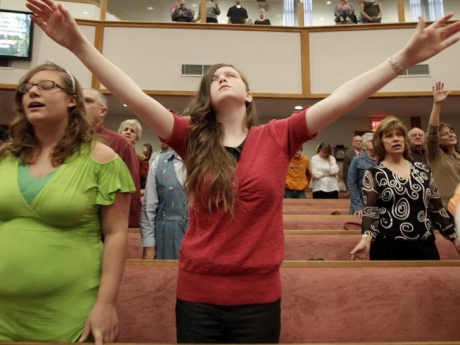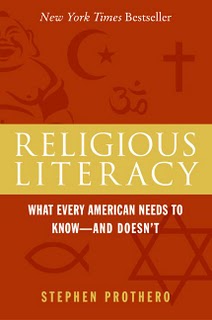Millennials: plenty spiritual, just not religious
 Tuesday, May 11, 2010 at 12:06AM
Tuesday, May 11, 2010 at 12:06AM 
USA Today story about Christian research firm surveying 1,200 18-to-29-year-olds, with almost three-quarters declaring their spirituality trumps their religiosity, meaning they belief--just not in churches.
If the trends continue, says the report, we'll see churches close as fast as bankrupt car dealerships.
Hmm, makes me wonder about my last trip to the Netherlands and speaking to a community group at a defunct church (I spoke from the sacristy--of course).
 Fits with Stephen Prothero's Religious Illiteracy: the notion that most Christians (two-thirds of Americans) are, in the words of the president of the research firm (LifeWay Christian Resources), Thom Rainer, "either mushy Christians or Christians in name only."
Fits with Stephen Prothero's Religious Illiteracy: the notion that most Christians (two-thirds of Americans) are, in the words of the president of the research firm (LifeWay Christian Resources), Thom Rainer, "either mushy Christians or Christians in name only."
Most are just indifferent. The more precisely you try to measure their Christianity, the fewer you find committed to the faith.
Prothero, whom I used in Blueprint, made the basic point that, throughout US history, our faithful have become more intense in their idiosyncratic belief-systems while becoming less knowledgeable about their actual religions to which they claim to belong--more religiosity with less religion.
I see this as the ultimate way ahead for religions the world over as globalization succeeds in spreading development. The competitive religious landscape allows for everyone to pick or craft their faith in the end, resulting in infinite variety and infinite direct connections to that which you hold dear.











Reader Comments (2)
Overcoming and avoiding this kind of dissolution of humanity and humanism into individuals and individualism is precisely what has brought us religion as a necessary pillar of our civilizing evolution. Forms of friendship marriage constitutional democracy and religion have evolved out of natural necessity and have been documented in our traditions our literature and all of our arts-- and are evolving still. They are there for us to work hard and make good use of. Questioning yes, studying yes, altering yes, categorically and dismissively setting oneself outside of or against this path in our evolution, if done at all, should be done with the same kind of seriousness dedication purpose and humanity that has succeeded in bringing it and us this far. (I believe that what Dr. Barnett and Prothero seem to be reporting as a feature in our views of religion is no more than a sign of a lapse in our civilizing discipline-- a lapse in discipline which I think may be a better candidate for a defining feature of our time and state.)
As a young history major, with parents who have seen the ugly side of Christianity--nasty nuns and Catholic School--I'm hard pressed to even give America's traditional religion a shot. Be it Catholic or a Protestant sect of Christianity.
Crusades, witch trials, sex scandals, and other bad press makes it difficult to believe there is good in Christianity. Of course there are great individuals out there that prove that sentence wrong, but that doesn't change my skepticism.
For the other two chapters in the one Gods plan I see similar issues. Israel seems to be in a holy war with Islam. How can I accept a faith as good when there is so much death and destruction? It's hard to believe things will change with the thousands of years of religious based chaos.
If I had to pick a religion, then I'd probably branch out to something totally different like Buddhism or Hinduism. I would, however, have to do some research before making a final choice. Is there any religion out there that doesn't have blood or sex juice on their hands?
On a side note I really enjoyed "Great Powers." It was great to read an optimistic outlook of the future. The new website also looks good.